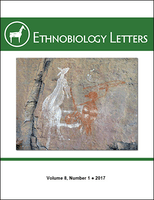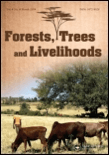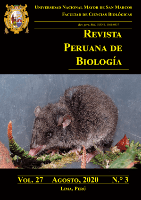
Ethnobiology Letters
Scope & Guideline
Cultivating Understanding of Ethnobiological Relationships
Introduction
Aims and Scopes
- Ethnobotanical Research:
The journal frequently publishes studies on the traditional uses of plants by various cultures, exploring how these practices contribute to biodiversity and cultural heritage. - Indigenous Knowledge Systems:
A significant focus is placed on the documentation and analysis of indigenous knowledge systems, particularly how they relate to environmental conservation and resource management. - Cultural Practices and Biodiversity:
The intersection of cultural practices with biodiversity conservation is a core area, examining how local customs and beliefs influence the management of natural resources. - Applied Ethnobiology:
Research that applies ethnobiological insights to contemporary issues, such as food security, conservation strategies, and sustainable agriculture, is a consistent theme. - Interdisciplinary Approaches:
The journal encourages interdisciplinary methodologies, integrating anthropology, ecology, history, and genetics to provide comprehensive insights into ethnobiological phenomena.
Trending and Emerging
- Climate Change and Indigenous Resilience:
Recent publications increasingly explore the impacts of climate change on indigenous practices and knowledge systems, highlighting the adaptive strategies communities employ to maintain their ecological and cultural resilience. - Conservation and Biodiversity Loss:
There is a growing emphasis on documenting local ecological knowledge as a tool for biodiversity conservation, with several studies focusing on how traditional practices can inform modern conservation efforts. - Food Sovereignty and Security:
The intersection of ethnobiology with food sovereignty movements has gained traction, with papers examining the role of traditional food systems in promoting sustainable practices and addressing food insecurity. - Interdisciplinary Collaborations:
Emerging themes include collaborations between ethnobiologists and practitioners from various fields, such as environmental science and policy, highlighting the importance of holistic approaches to managing ecosystems. - Cultural Heritage and Identity:
Research on the role of ethnobiology in shaping cultural identity and heritage is on the rise, reflecting a broader societal interest in preserving traditional knowledge as a means of cultural continuity.
Declining or Waning
- Historical Ethnobotany:
There has been a noticeable decrease in studies focused on historical ethnobotany, particularly those that explore plant uses from a historical perspective, as seen in fewer papers discussing historical plant nurseries or ancient practices. - Traditional Ecological Knowledge (TEK) in Agriculture:
Although TEK remains a core element, the specific focus on agricultural practices has waned, with fewer papers addressing traditional farming techniques and their contributions to biodiversity. - Linguistic and Cultural Studies in Ethnobiology:
Research that intersects linguistics and cultural studies, while still present, appears to be less frequent, suggesting a shift toward more empirical and applied research methodologies. - Ethnozoology Studies:
The focus on ethnozoology, particularly studies related to animal husbandry and local animal knowledge, has seen a decline, with fewer papers dedicated to the relationships between humans and non-plant species.
Similar Journals

Indian Journal of Traditional Knowledge
Illuminating the Intersection of Culture and MedicineThe Indian Journal of Traditional Knowledge, published by the NATL INST SCIENCE COMMUNICATION-NISCAIR, serves as a pivotal platform for scholarship in the fields of traditional knowledge, complementary and alternative medicine, and manual therapy. With an ISSN of 0972-5938 and an E-ISSN of 0975-1068, this esteemed journal has embraced open access since 2002, ensuring that research is widely available to practitioners and scholars alike. Based in New Delhi, India, and with a commendable Q2 ranking in both the Complementary and Alternative Medicine and Complementary and Manual Therapy categories as of 2023, this journal aims to bridge the gap between traditional practices and modern scientific inquiry. By publishing innovative research and review articles, it not only highlights the rich cultural heritage and knowledge systems of India but also contributes to the global discourse surrounding holistic health and wellness. Researchers, professionals, and students will find invaluable insights and significant advancements within its pages, making the Indian Journal of Traditional Knowledge an essential resource for anyone interested in the dynamic interplay between tradition and contemporary medical practice.

NORTHWEST SCIENCE
Bridging regional insights with global implications.NORTHWEST SCIENCE, published by the NORTHWEST SCIENTIFIC ASSOCIATION, serves as a vital resource for researchers and professionals in the fields of ecology, evolution, and systematics. With an ISSN of 0029-344X and an E-ISSN of 2161-9859, this journal has been disseminating valuable scientific insights since its inception in 1975 and continues to do so into 2024. Although currently positioned in the Q4 quartile for its category, it plays a crucial role in advancing the understanding of ecological and biological sciences, reflecting a diverse range of studies and methodologies. Researchers will find the journal particularly appealing due to its emphasis on regional studies and their implications on a global scale. While NORTHWEST SCIENCE is not an open-access publication, it provides significant contributions to the academic dialogue within its discipline, making it an essential addition to the library of any dedicated researcher, student, or professional in the environmental sciences.

ACTA SOCIETATIS BOTANICORUM POLONIAE
Connecting Researchers to the World of BotanyACTA SOCIETATIS BOTANICORUM POLONIAE is a reputable open-access journal dedicated to the field of Plant Science, published by the Polskie Towarzystwo Botaniczne since 1923. With an ISSN of 0001-6977 and an E-ISSN of 2083-9480, this journal has made significant contributions to the botanical sciences, fostering the dissemination of research from Poland and beyond. The journal has ranked in the third quartile (Q3) within its category in the 2023 journal metrics, demonstrating a strong presence in the global academic community, as evidenced by its Scopus ranking of 291/516 within the Agricultural and Biological Sciences sector, placing it in the 43rd percentile. While specific H-Index data are currently not available, ACTA continues to attract submissions from a broad international audience and publishes a wide range of studies that advance the understanding of plant biology, ecology, and conservation. The journal remains a vital resource for researchers, professionals, and students alike, committed to enhancing knowledge and collaboration in botanical science.

Ethnobiology and Conservation
Empowering Research for Ecological SustainabilityEthnobiology and Conservation is a pivotal academic journal published by UNIV ESTADUAL PARAIBA, EDITORA-EDUEP, dedicated to advancing the fields of ethnobiology, anthropology, ecology, and conservation science. With an ISSN of 2238-4782 and consistent publication since its inception in 2012, this journal has established itself within the academic community, achieving Q2 rankings across multiple categories including Animal Science, Anthropology, and Plant Science as of 2023. Its diverse scope seeks to bridge the gap between traditional ecological knowledge and contemporary scientific practices, making it an essential resource for researchers, professionals, and students engaged in these interdisciplinary studies. The journal's impact is underscored by its competitive Scopus rankings, including a notable percentile ranking in key scientific disciplines. By committing to open access dissemination of knowledge, Ethnobiology and Conservation plays an integral role in fostering global collaboration and understanding of biodiversity and cultural practices. Researchers and practitioners are encouraged to contribute to this vibrant academic dialogue that champions sustainable practices and the conservation of ethnobiological resources.

Forests Trees and Livelihoods
Transforming Forestry Insights into Community BenefitsForests, Trees and Livelihoods is a distinguished journal published by Taylor & Francis Ltd, focusing on the intricate relationships between forestry, environmental sustainability, and rural livelihoods. With an ISSN of 1472-8028 and an E-ISSN of 2164-3075, this journal has been a pivotal platform since its inception in 1999, converging on contemporary issues through 2024. Ranked in the Q2 quartile of the forestry category, it stands at rank #77 out of 174 in Scopus, evidencing its significance in agricultural and biological sciences. The journal aims to disseminate novel research findings, policy analyses, and case studies that inform sustainable forestry practices and contribute to improving the livelihoods of communities reliant on forest resources. Through its commitment to quality and accessibility, Forests, Trees and Livelihoods is an essential resource for researchers, professionals, and students striving to enhance understanding and practices in the field of forestry.

GENETIC RESOURCES AND CROP EVOLUTION
Unlocking the Secrets of Crop Diversity and EvolutionGENETIC RESOURCES AND CROP EVOLUTION is a leading academic journal dedicated to the exploration and advancement of genetic resources in agriculture, evolutionary biology, and plant science. Published by Springer in the Netherlands since 1992, this journal aims to foster a greater understanding of the genetic basis of crop evolution and diversity. With a robust impact reflected in its Q2 status in multiple categories, including Agronomy, Ecology, and Plant Science, it ranks impressively within the top quartiles of its fields. As of 2023, it continues to be an essential resource for researchers, professionals, and students who seek to enhance sustainable crop production and biodiversity conservation through innovative genetic methodologies. The journal promotes high-quality, peer-reviewed research that contributes valuable insights into the genetic adaptation of crops in response to environmental changes. While the journal is not open access, its esteemed reputation ensures that the insights it provides reach a wide audience eager to address some of today's most pressing agricultural challenges.

REVISTA PERUANA DE BIOLOGIA
Advancing Biological Research Through Open AccessREVISTA PERUANA DE BIOLOGIA, an esteemed journal published by the Universidad Nacional Mayor de San Marcos, Faculty of Biological Sciences, has been a vital platform for disseminating significant biological research since its inception in 1974. With an Open Access model, this journal ensures that high-quality research is freely available to readers across the globe, fostering the advancement of knowledge within the field of agricultural and biological sciences. Despite proprietary challenges, the journal has secured a respectable Q3 category ranking in Agricultural and Biological Sciences and currently holds a 137th rank in Scopus among its peers. By embracing a comprehensive scope, REVISTA PERUANA DE BIOLOGIA encourages submissions that contribute to diverse biological topics, making it an essential resource for researchers, professionals, and students looking to enhance their understanding and expertise. With its ongoing commitment to excellence, this journal remains a cornerstone of biological research in Peru and beyond, reinforcing the importance of collaboration and knowledge sharing in the scientific community.

ACTA BIOLOGICA COLOMBIANA
Fostering Collaboration in Biological ResearchACTA BIOLOGICA COLOMBIANA, published by UNIV NAC COLOMBIA, FAC CIENCIAS, DEPT BIOL, is a significant open-access journal dedicated to advancing research in the field of agricultural and biological sciences. Since its inception in 2005, this journal has provided a dynamic platform for scholars to share their findings, fostering scholarly communication and collaboration within the scientific community. With an ISSN of 0120-548X and an E-ISSN of 1900-1649, it maintains a visible presence in the academic landscape, evident in its Q3 ranking in the 2023 Agricultural and Biological Sciences category and a Scopus rank of 117 out of 221, placing it in the 47th percentile. The journal's commitment to inclusive access facilitates greater dissemination of knowledge, as it serves researchers, professionals, and students in Colombia and beyond. Spanning articles from 2008 to 2024, ACTA BIOLOGICA COLOMBIANA is poised to continue its vital role in shaping the future of biological research.

Conservation Letters
Bridging Research and Real-World Conservation SolutionsConservation Letters, published by Wiley, is a premier peer-reviewed journal dedicated to advancing the field of conservation science. As an Open Access journal since 2015, it provides researchers, practitioners, and policymakers with immediate access to cutting-edge research and insights that shape effective conservation strategies globally. With an impressive impact factor and a distinguished standing in the academic community—ranking in the Q1 category in disciplines such as Ecology, Evolution, and Nature Conservation—the journal plays a vital role in disseminating high-quality research that informs environmental practices. Based in the United States, it encompasses a broad scope of topics aimed at bridging scientific findings with real-world applications, effectively contributing to the understanding and preservation of biodiversity. Researchers looking to publish innovative work in an influential platform will find Conservation Letters an essential venue for ensuring their research reaches an engaged international audience.

Plants People Planet
Innovating Interactions between Plants and People.Plants People Planet is a leading academic journal published by Wiley, focusing on the intricate relationships between plants, people, and the planet. Since its debut as an Open Access publication in 2019, it has quickly established a significant presence in the scholarly community, achieving impressive rankings in multiple categories. Notably, it holds a prestigious Q1 ranking in Ecology, Evolution, Behavior and Systematics, Forestry, Horticulture, and Plant Science as of 2023. With its dedicated scope addressing crucial ecological and horticultural advancements, this journal is essential for researchers, professionals, and students who aim to explore interdisciplinary approaches to sustainable plant management and environmental stewardship. Operating from the United Kingdom, it serves a global audience of scholars, providing an invaluable platform for disseminating innovative research and fostering collaborative dialogue in these pivotal fields. For those interested in cutting-edge research that bridges the gap between human practices and ecological health, Plants People Planet is a must-publish venue.